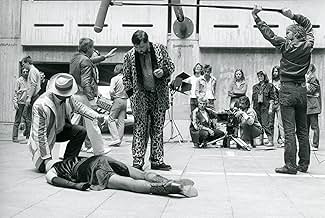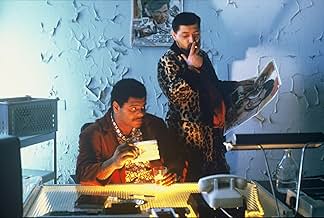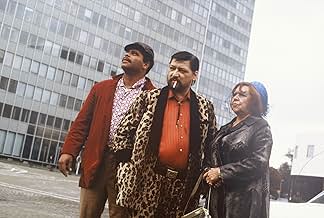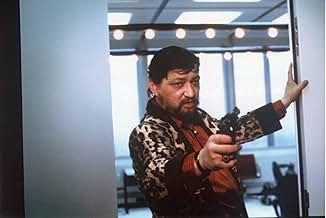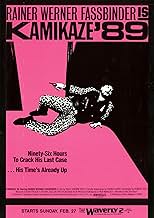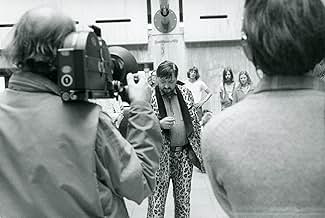Adicionar um enredo no seu idiomaIn a totalitarian society of the future, in which the government controls all facets of the press, a homicide detective investigates a string of bombings, and finds out more than he bargaine... Ler tudoIn a totalitarian society of the future, in which the government controls all facets of the press, a homicide detective investigates a string of bombings, and finds out more than he bargained for.In a totalitarian society of the future, in which the government controls all facets of the press, a homicide detective investigates a string of bombings, and finds out more than he bargained for.
- Prêmios
- 1 vitória e 3 indicações no total
- Wechselschichtregisseur
- (as Andreas Mannkopf)
- Polizeiärztin
- (as Ute Fitz-Koska)
- Polizist
- (as Hans-Eckhardt Eckhardt)
- Direção
- Roteiristas
- Elenco e equipe completos
- Produção, bilheteria e muito mais no IMDbPro
Enredo
Você sabia?
- CuriosidadesThis was the final acting role for Rainer Werner Fassbinder.
- Erros de gravaçãoThe movie claims 27 September 1989 to be a Monday, but that day was a Wednesday (The movie plays in 1989, as the title and a spoken intro make clear. The supposed explosion in the beginning of the movie was planned to take place on September 23, as Jansen points out. The chief of the police then urges Jansen to solve the case within for days, saying "until Monday afternoon," which would be September 27).
- Citações
Policewoman: Suicide
Polizeileutnant Jansen: It would be the first in four years.
Policewoman: Sorry, I meant 'premature death.
- ConexõesFeatured in Fassbinder (2015)
The story takes place in 1989, 1989 as anticipated in 1982, in a future and totalitarian Germany. Fassbinder plays in this film the role of police lieutenant Janssen, called to investigate a suspected bombing, followed by a crime in the corporate headquarters that controls the morale of the population through television entertainment. His mission to solve the crime in the next four days is hampered by the fact that in the utopian society described in the film, officially, there are neither crimes nor suicides. The world of 'Kamikaze 89' is a rosy dystopia, in which the population is kept under control by Big Brother surveillance while the brains are washed and occupied by television shows such as the 'World Laughter Record'. The cynical, alcoholic and disillusioned Janssen may be the right man to solve this case, but as the circle of suspects gets closer to the company's bosses and that mysterious, secret '31st floor' in which the scenarios of future are written, the solving of the crime becomes a danger for the stability of the system.
The comparison between the future imagined in the literature and the films of anticipation and the reality of the anticipated period is, as always, fascinating. Although the interval is only seven years, the essential changes are those that take place in the social structure. Director Wolf Gremm did not have a budget that would allow him to create spectacular special effects, so he relied more on cultural extrapolations, some subtle, some less subtle. The Internet does not exist yet, and computers are as large as refrigerators and do not have graphical interfaces. Telephony and mobile videophones are controlled by the authorities. The population is fascinated by popular entertainment, and on this topic Gremm was able to correctly anticipate the devastating effect of 'reality show' genre, even if the phenomenon he described will occur one or two decades later than 1989. Electronic music and psychedelic clothing have become an aesthetic norm, and if we look at some societies in Asia today, we see that cultural conformism is not necessarily gray and militarized there. Leopard coats or jackets are police uniforms. The control of populations is facilitated by their addiction to escapist entertainment. The framing of the film in the patterns of the genre of punk anticipation is formally correct, but the stylistic decisions are motivated by a clear and not at all optimistic vision about the future.
Fassbinder's acting reminded me Orson Welles in the second part of his career. The director who gave the world in his youth the masterpiece 'Citizen Kane' constantly projected for grand plans, but after a few financial failures Hollywood no longer believed in him as a director. The result was that he appeared more as an actor, some of his roles were memorable as he succeeded to be both expressive and 'to melt' in his characters, modeling them according to his personality.
'Kamikaze 89' anticipates from many points of view the world 30 years later, with the domination of the big global corporations and the popular entertainment and communications as means of leveling the thinking of the population. 1989 however brought something else, the fall of the Iron Curtain followed by the reunification of Germany, historical events that Fassbinder prepared and anticipated artistically and ideologically in other films. Those were the milestones in the evolution towards the world of 'Kamikaze 89'.
- dromasca
- 19 de abr. de 2020
- Link permanente
Principais escolhas
- How long is Kamikaze 89?Fornecido pela Alexa
Detalhes
Bilheteria
- Faturamento bruto nos EUA e Canadá
- US$ 22.440
- Fim de semana de estreia nos EUA e Canadá
- US$ 5.613
- 5 de jun. de 2016
- Faturamento bruto mundial
- US$ 22.440
Contribua para esta página



